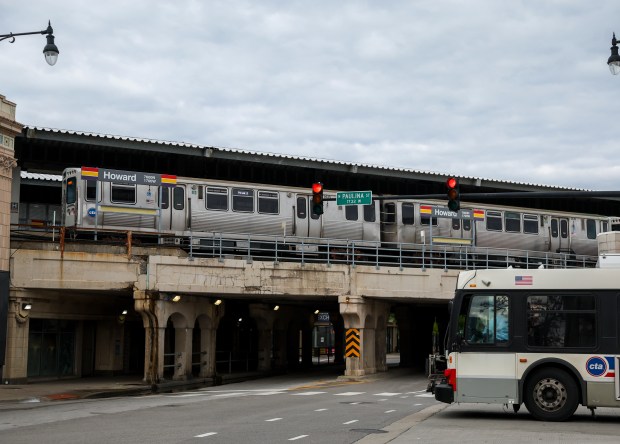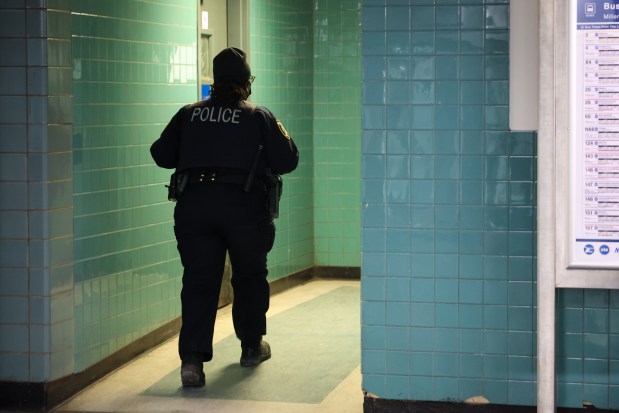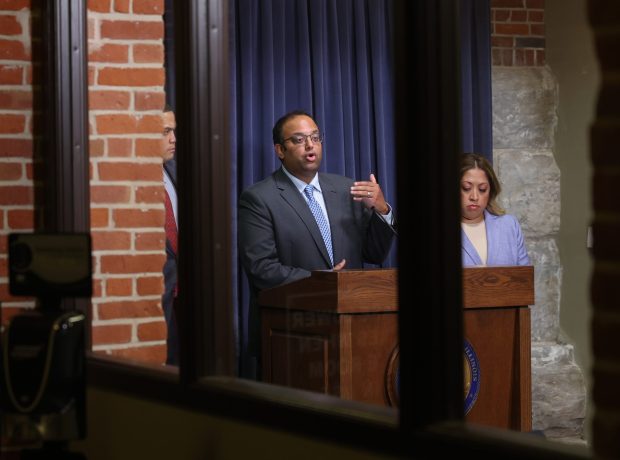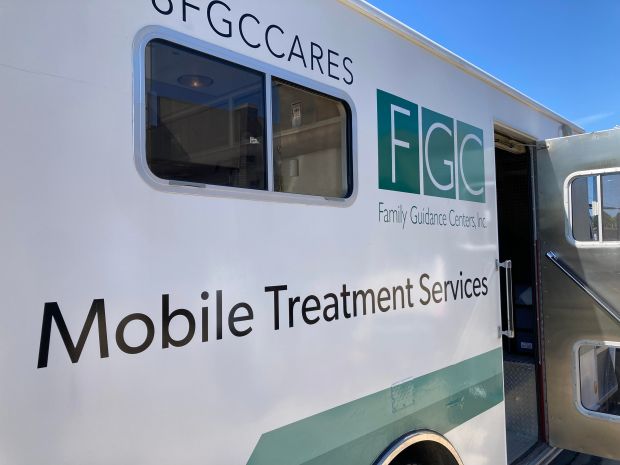SPRINGFIELD — After months of negotiations amid warnings of potentially drastic service cuts, Illinois lawmakers on Thursday introduced a bill they said addresses the expected $771 million financial shortfall for Chicago-area public transit with proposals that include a 50-cent hike on Illinois toll roads and an additional tax on ride sharing services.
“The funding mechanism we put forward, with estimates, gets us above the fiscal cliff amount,” Democratic Sen. Ram Villivalam of Chicago, chair of the committee covering transportation, said. “The goal is to ensure that we’re funding a system not for tomorrow, not for next year but for decades to come.”
Key labor organizations were quick to question the proposal introduced Thursday in the Senate, citing concerns over the long-term viability of the funding streams. Also voicing opposition were suburban officials who said the bills put the interests of mass transit users, most of them in Chicago, above those of their constituents.
Transit agencies have said services would be slashed if legislators don’t come up with funding to plug the budget shortfall expected when COVID-19 relief funding runs out at the end of this year. With the spring legislative session set to end this weekend, agencies have said they will need to start planning for those cuts soon, though lawmakers could take up the issue to later in the year.
The bill introduced in the Senate on Thursday has similarities with a House proposal a day earlier that include replacing the Regional Transportation Authority with an entity called the Northern Illinois Transit Authority that would be given with broad planning responsibilities. Only the Senate version, however, offered funding proposals.
The House version of the bill passed out of the chamber’s executive committee by an 8-4 vote on Thursday and was scheduled to go before the full chamber for a vote despite questions about the lack of financing. Concerns also were raised about how the legislation could jeopardize the bonding authority for the Chicago Transit Authority to see through its planned extension of the Red Line.
The Senate revenue proposals, which include transit agency staff cuts in addition to an increase on toll roads, would not fully cover the $1.5 billion that some transit advocates say is needed to transform Chicago-area public transportation, Villivalam told reporters, though he later added a final estimate on how much the proposals would raise is not yet known. The legislation did not come to a vote in the Senate committee.
The bill would require the revamped transit governing board, NITA, to make cuts that could include layoffs. It mandates $10 million in transit service-related savings and $20.1 million in savings on labor, which the bill suggests would come from changes in employee headcounts and position types. Those changes have previously been suggested by the RTA.
A key provision allows the transit board to impose a surcharge of 50 cents on roads operated by the Illinois State Toll Highway Authority. The tax would be capped at $1 per vehicle per day, according to the legislation. The bill also includes a 10% tax on rideshare trips in Chicago, suburban Cook County, or the collar counties.
The Senate proposal also asks for $16.8 million in savings from property and real estate. The savings would need to be realized in NITA’s budget for the fiscal year beginning in October 2026.
The bill also includes a real estate transfer tax in the collar counties and suburban Cook County. In Cook County, half of the revenues from that tax would go toward CTA pension payments, with leftover funds going to transit operations. The other half would go toward a fund designed to encourage transit-oriented development that is designed to boost ridership and create walkable communities and commercial corridors. Taxes levied in the collar counties would go entirely toward that development fund.
Interest earned on money in the state’s road fund would also need to go toward public transit construction projects, according to the bill.
Labor leaders argued the funding proposals wouldn’t provide long-term security for the transit systems.
“We strongly oppose any transit governance reform legislation that lacks a dedicated and sustainable revenue source,” said Marc Poulos, executive director of the labor-management group for the International Union of Operating Engineers Local 150.
Tim Drea, president of the Illinois AFL-CIO, said in a statement that the two legislative proposals “[kick] the can down the road and [set] our state up for a future fiscal crisis.” The Amalgamated Transit Union Local 241, which represents CTA bus operators, opposes the Senate bill.
Representatives from the collar counties pushed back against several of the revenue ideas Thursday.
“The Senate plan steals $72 million dollars in DuPage tax revenue, imposes a local real estate transfer tax with no oversight from the County, and taxes suburban commuters,” DuPage County Board Chair Deborah Conroy said in a letter opposing the bill Thursday. “If passed as written, DuPage County will be forced into massive layoffs, crippling our ability to provide safe streets and neighborhoods for our nearly 1 million residents.”

Republican Sen. Donald DeWitte of suburban St. Charles said the Senate bill subsidizes mass transit in Chicago at the expense of the suburbs, citing the tollway tax proposal and other measures.
“The suburbs get taxed, Chicago gets control, and that’s outrageous,” he said.
Like the House bill introduced Wednesday, the Senate version would remake the board of the RTA, renamed as the NITA, with five appointments from the governor in addition to existing appointments from the mayor of Chicago, the Cook County Board President and the collar counties.
The bill also calls for a unified fare system between all Chicago area transit agencies by 2030.
In a statement Thursday, RTA spokesperson Tina Fassett Smith said the agency was reviewing the Senate legislation but again stressed the need to get something done soon. “The region’s transit system serves more than 1.2 million rides each day,” Fassett Smith said. “Having funding certainty by May 31 is essential to ensure CTA, Metra, and Pace can continue to provide safe, reliable, affordable transportation for all.”
Representatives for CTA, Metra and Pace did not immediately provide comment Thursday.
Funding for the proposed CTA Red Line extension south of 95th Street was one point of discussion in a hearing on the House version of the bill Thursday.
The multibillion-dollar project would extend the train line south to 130th Street and add four stations. The project, discussed for more than 50 years, has the potential to be a major investment in the city’s Far South Side, even as it has meant acquiring dozens of residents’ homes.
After Thursday’s House hearing, state Rep. Marty Moylan, a Des Plaines Democrat who heads the House Transportation Committee, said the removal of the CTA’s bonding authority from the bill was an oversight and should be addressed with another amendment.
“This is a major program that’s going to redo the whole face of transit and you’ve got to look at the greater good, which is we’re going to have an operating transit system, which is going to have reforms and operating more efficiently and safe so that people can actually ride the system,” Moylan said of the transit reforms as a whole.

Among the issues discussed on the House bill was the proposed system-wide law enforcement task force. Led by the Cook County sheriff’s office, the system would also include Metra and Chicago police officers, as well as Illinois State Police personnel.
Rep. John Cabello, a Republican from Machesney Park who has also worked as a police detective, said at the hearing he’d prefer to have the task force run by law enforcement throughout the newly-proposal transit system.
“I’d rather have Metra police…take care of the whole thing because their police department goes through the whole of those counties,” Cabello said after the hearing.
Rep. Eva-Dina Delgado, a Chicago Democrat and the main House sponsor of the bill, indicated she’s open to discussions about that but also noted how the Cook County sheriff’s office has relationships outside the county.
“They currently have a relationship with Metra on dispatch and so they have some relationships outside of Cook County and they’re centralized in that way,” Delgado said. “So, that’s where the thought process came from.”




